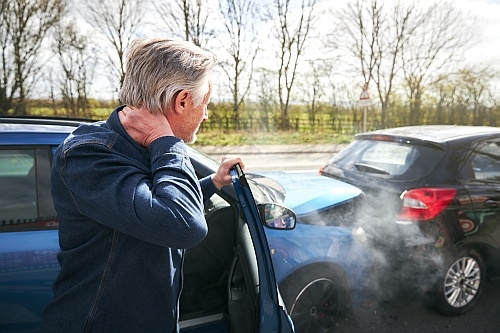Car accidents are not always solely the result of driver negligence. Sometimes environmental conditions affect the road. In an appellate case, a man appealed from a trial court’s decision to grant summary judgment after a three-car crash. The evidence showed that the plaintiff was driving in a pickup truck on Highway 27, near its intersection with Aspinall Break Road. The plaintiff was following a tractor-trailer driven by one of the defendants, Hollis Bryant. Another tractor-trailer was following the plaintiff.
The crash happened on a smoky and foggy day when an unknown driver made a U-turn on the highway. The smoke and fog were thick and went on for 1.5 miles, so the plaintiff’s vision was limited. He was in smoke for about two minutes, and he reduced his speed. The defendant tractor-trailer driver also slowed down.
One of the drivers noted that it smelled like trees burning. The defendant driver slowed down suddenly in his tractor-trailer. The plaintiff hit the trailer from behind. The second tractor-trailer hit the plaintiff. A sandwich effect occurred with the plaintiff in the middle.
A state trooper responding to the accident later confirmed that there was fog and smoke coming from the east side of the highway. The state trooper’s opinion was that the fog and smoke played a role in the accident.
In addition to the tractor-trailer driver that he had been following, the plaintiff sued the person who was conducting controlled burns on the east side of the highway. The defendant had conducted a controlled burn in that location, but the state trooper didn’t know the location of it and acknowledged any fire started in that location could have caused the smoke.
The defendant had conducted three of these burns over 120 acres. He managed smoke by not conducting a burn if the wind was carrying the smoke towards the highway. On each of the three mornings, the defendant lit test fires to check the direction of the wind before starting. The defendant did not conduct burns on the day of the accident and did not know the source of the smoke on the highway.
The trial court did not find evidence in the record that identified the defendant’s burns or any other fire as the source of the smoke that had created poor visibility on the highway. The court explained there was no testimony that would tend to show smoke present on the highway the next day was from the same direction as the man’s controlled burns. Accordingly, in connection with the summary judgment motion, the court found that the plaintiff had failed to establish gross negligence.
The plaintiff appealed. He argued that the trial court had erred there was no link between the smoke and the prescribed burn. The plaintiff argued that the smoke mixed with fog to create limited visibility and that there was enough circumstantial evidence about the location of the one controlled burn in that area to create a jury issue about whether the defendant’s controlled burn had caused the smoke.
The appellate court disagreed. It explained that the plaintiff had the burden of proof to establish all elements of his negligence claim. The plaintiff had to introduce evidence that permitted a reasonable basis to conclude that the smoke created by the defendant was more likely than not the cause of the plaintiff’s injuries. Mere possibility was not enough to withstand a summary judgment motion.
The plaintiff had not provided evidence showing that the defendant’s smoke was coming from the property where the defendant had conducted a controlled burn. There was also no evidence to show the controlled burn had re-ignited and created a wall of smoke and fog or the likelihood of that occurrence based on the wind conditions.
The plaintiff had argued the defendant’s burn was the only possible source of fire, but he had not shown that there were efforts to locate any other sources of fire. The appellate court also explained that gross negligence under OCGA § 51-1-4 is defined as an absence of even slight diligence. There was no evidence to show that the defendant had failed to exercise even slight care. It affirmed the summary judgment.
If you are hurt due to negligence, you may be able to recover compensation for your losses. It is important to retain a personal injury attorney who understands not only how to take a case to trial, but also understands the potential insurance issues. Experienced Atlanta personal injury attorney Terrence R. Bethune can evaluate your case and fight for any compensation you may deserve. Contact us at 404-875-7800 or via our online form.
More Blog Posts
What is an Ante-Litem Notice in Georgia? February 28, 2014
Proximate Cause in Georgia Car Accidents, February 13, 2014
Tandem Driving Theory of Liability in Georgia Car Accidents, February 4, 2014
Subject Related Articles

What to Do After a Hit-and-Run Accident
So you’ve just been in a hit-and-run accident. Your first thought is probably to chase down the other driver, but that may not be the
April 19, 2024

Difference Between a Wrongful Death Claim and an Estate Claim
So you’ve recently lost a loved one, and you’re not sure of the differences between a wrongful death claim and an estate claim. Don’t worry,
March 22, 2024

Elderly Driver Accidents in Macon: What to Do
Macon, Georgia, like many communities across the United States, faces a growing population of senior citizens. While this demographic shift brings undeniable benefits, it also
February 22, 2024





